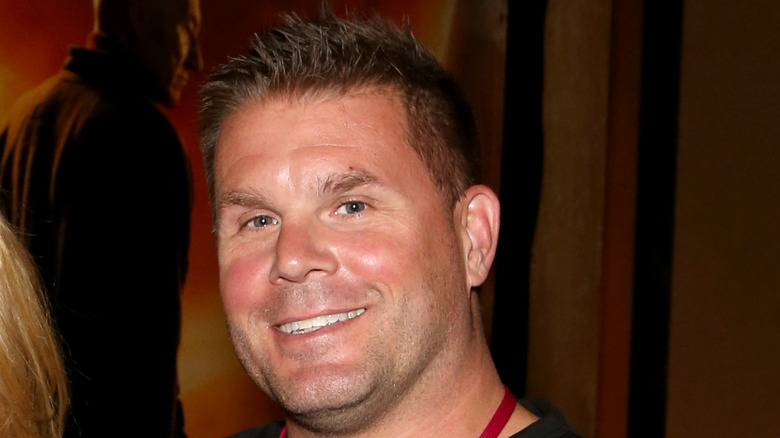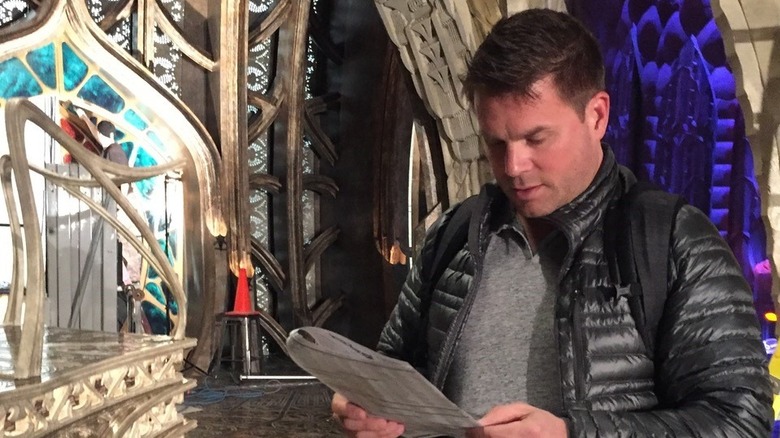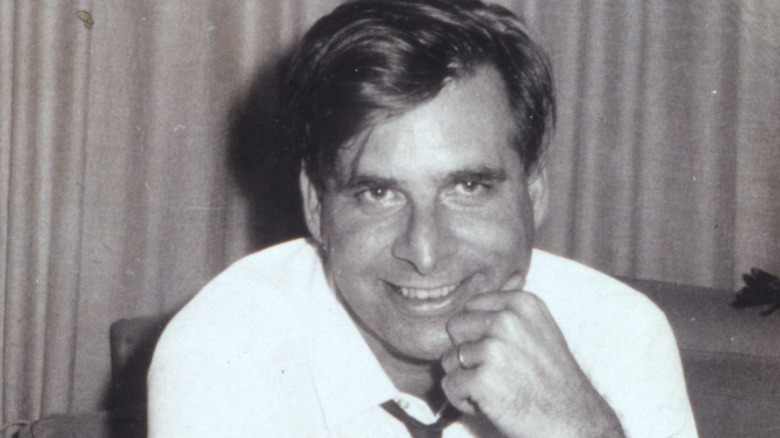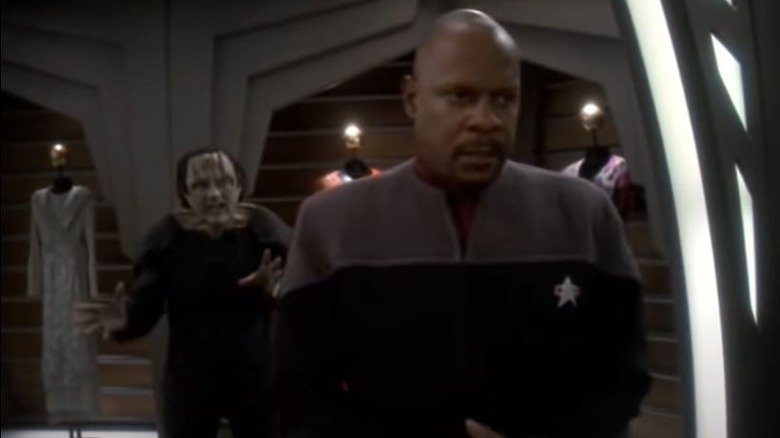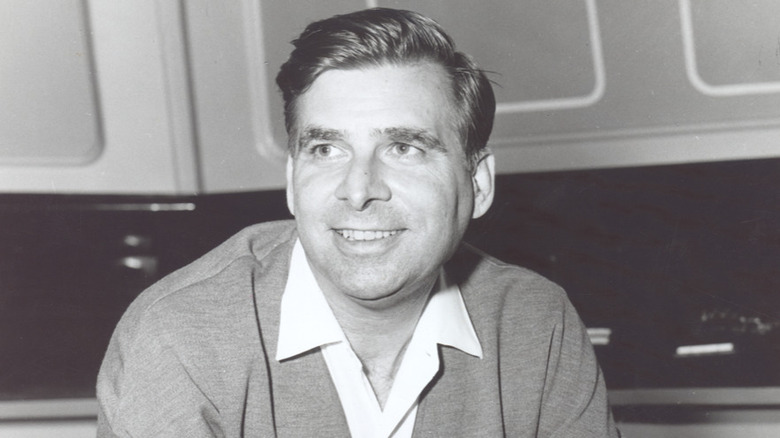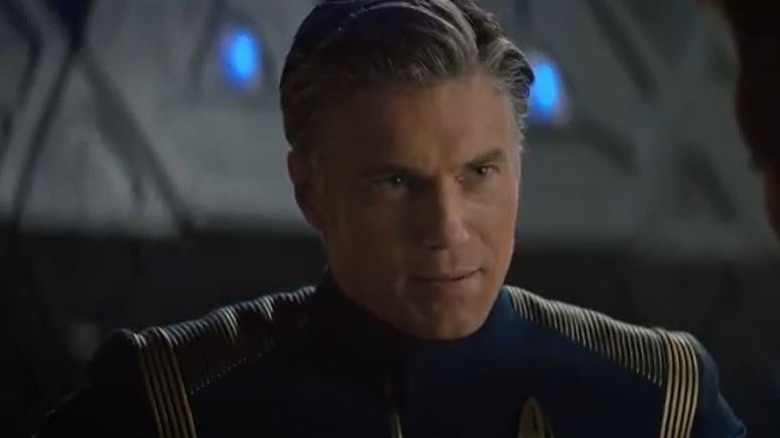Rod Roddenberry Celebrates His Father Gene's Centennial - Exclusive Interview
August 19, 2021 marks the centennial of Gene Roddenberry. The creator of "Star Trek," who died in 1991, would have turned 100 this year. "Star Trek" predicted the future in many ways — even low-level cell phones have blown past what "Trek" characters used as comm devices by the late '90s — and it's going strong in its third big franchise wave. It's hard not to wonder what Gene would have thought about what "Trek" has become, but thankfully we have someone who can help: His son, Eugene "Rod" Roddenberry, Jr.
Rod didn't have any interest in "Star Trek" growing up, but became deeply invested after the death of his father. He spoke to "Trek" fans at cons, family friends, and coworkers of his father — a journey shown in his documentary "Trek Nation." Rod is now the CEO of Roddenberry Entertainment, an executive producer on "Star Trek: Discovery," and one of the foremost experts on his father.
Looper spoke with Rod about his father's centennial, the work done by Roddenberry Entertainment, why there were no LGBT characters for most of the franchise's run, and how the rough-and-tumble "Deep Space Nine" squares with the classic utopian "Trek" ethos.
A day in the life of Roddenberry Entertainment's CEO
Why do you go by Rod and not Gene, Eugene, Gene Jr., any of those?
So my father and I actually have the exact same name, Eugene Wesley Roddenberry. In World War II he was given the nickname Rod and I'm guessing that was just for abbreviation and to keep things short. But then as he left the military, eventually it became Gene. And when I was born, he decided to give me the nickname of Rod. So that is why now I've made the mistake, my entire life, of being called both; people out there think there is a Rod Roddenberry and a Eugene Roddenberry, which could work to my benefit if I ever do anything wrong. But the truth is I am the one person. So all blame goes my way.
So what's a typical day in the life of the CEO of Roddenberry Entertainment like?
I'm very fortunate in many ways, I have an incredible team of people who are more talented, more intelligent than I am in many areas. And they do a lot of the leg work and hard work for me. I've got the privilege of sitting at the top of the meeting and listening to the ideas and approving what goes through. I've even got my business partner, Trevor Roth, who I would say is pretty much an equal and does a lot of that as well. But I get to come in with an eye for ideas and share them. I get to give feedback to whether it's "Star Trek" scripts, or internal developments. We get to come up with great ideas. And sometimes they're not even entertainment-based. We have a family foundation called the Roddenberry Foundation, and that is our philanthropic arm and sort of the way of finding the people and institutions out there that are working towards a long-term advancement for the species and trying to help those people and institutions along financially. So we can get to that future.
Do you mind mentioning any of the names of those institutions? You don't have to mention them all, just a few ones.
No, absolutely. The Gladstone Institute in San Francisco, we partnered up with them a long time ago. They didn't themselves pioneer, but they brought in the Nobel Prize winner for stem cell biology for pluripotent stem cells. For those of you who don't know, and I can only repeat what I've heard over and over, which is instead of taking embryonic cells from a fetus, they can take any cells, adult male skin cell, and reverse engineer it into a heart cell, a kidney cell, liver cell. And we're at the point right now where they can have sheets of that. And whether it's testing drugs on them, because there are many different kinds of drugs and medicines for heart conditions and those sorts of things. And some of them do not react well to the human body. So to be able to test these things on yourself before they go into you to find the best one is truly spectacular.
Not to mention the idea that one day they can probably, hopefully, grow new organs for us. They are certainly on the cutting edge of this sort of thing. There are many other institutions doing it around the world, but we have partnered with them. And one reason I really appreciate this collaboration — they're not in it to get their name on the papers. They're not in it for the fame and the fortune. They are collaborating with these other institutions around the world and sharing their data. They're doing it for the right reasons. They want to make the future a better place. That is one of the organizations that we work with, and we've got a number of other programs that work at different levels on the philanthropic scale for people around the world.
What Gene Roddenberry said about LGBT characters
You said cutting edge. And that leads me very well to my next question: I've seen you mention in the past that the reason "Star Trek" seems to have predicted so much with technology is that your father would talk to scientists and futurists and philosophers and actually ask them what is realistically coming on down the line. And now we've got these cell phones here that do twice as much as what we saw on "TNG" alone. And I know you're an executive producer with a lot of the new "Trek" shows. Do you go out or does anybody involved in the new "Trek" go out and keep looking up the new technology the same way?
I don't, although I love technology. So I just as a fan research it, but that doesn't necessarily play into the production. Early on there wasn't necessarily an official science advisor, but they did figure that out and they do have science advisors now making sure to the best of their ability that the science that is used is on some level accurate. And I only say it that way because sometimes more so than we want. Sometimes you have to bend the laws of physics, maybe even reality too, to make the story work. However, I don't like it when they do that, especially if it compromises the story.
Your father was very proud of putting a Black woman on the bridge and in a regular role. And I don't want to play too much of the "what would Gene Roddenberry think of" game, but what do you think he'd think of the fact that the current flagship "Star Trek" show is run by a lesbian literally named Michelle Paradise?
Let me answer that. My father, back in the late '80s, was asked why there were no gay people on "Star Trek" and the truth is at the time, the studios and networks ... let me rephrase that. Not just why aren't there gay people, but why aren't there episodes that go into that. "Star Trek" was always about pushing the envelope and talking about social issues. And it did in many ways. And I tried in later incarnations to touch on these things, but it was always a little bit too sensitive for the networks, for the studios. And to be honest, the studios knew that there's a demographic out there that would be up in arms about that. And I do not agree with their reasons, but they decided not to do that.
However, the answer my father gave back then, which I thought was a little bit of a copout but later on really appreciated, was that he said, "What do you mean? There's plenty of gay people on 'Star Trek,' hell, half the Enterprise is filled with gay people. You just don't see it because it's not a thing in the future. The stereotype isn't there, it's not relevant or important to who a person is. They don't have to wear a rainbow flags or do any of the stereotypes of being gay." That is a beautiful answer, as well as a copout. It's still a beautiful answer because that's what we should aspire to. And what would my father say? First of all, I don't know if he would say anything because he was such a forward thinker that it wouldn't really be on his mind. And secondly, if he had to say something, it would be "It's about damn time. Let's hire whoever's right for the job, regardless of whatever the hell it is they do."
That reminds me, I watched "Trek Nation" the other night to help prepare for this. Very good documentary, by the way.
Appreciate that very much, thank you.
I appreciate how you were able to dive into the fan culture, but also be very realistic about your father and how he was very human. He was writing about things in the future, but he had his own problems. But the thing I remember is D.C. Fontana said she was hired at first, not because she was a woman, but because she was the right person for the job and never had to face that. But I also think it's a little spot on that last name is Paradise, what with the optimistic future.
I do think that is pure chance, but I've never thought of that. I think it's beautiful.
How Deep Space Nine fits with Gene's utopic future
Whenever there's a new "Trek" project — and this has been true ever since your father has unfortunately passed, we're celebrating his centennial here — but since then, a lot of new "Star Trek," it's kind of deviated a little bit from his optimistic future vision. The new shows do this a little bit, but the most obvious example was "Deep Space Nine," which showed a very flawed, frustrated, humanity and other species. And especially in the later seasons, when there was war and conflict among the crew, what do you say to people who say, "well, that's not Gene's vision"?
The truth is I've had to struggle with that myself. I am a product of "The Next Generation." I kind of grew up with "The Next Generation." Of course, I've seen the original a few times, but I love the "Next Generation" cast. I think it shows us who we could be one day as a species. I think it shows us what true leadership is. A leader doesn't have to lead by saying "You do what I do or what I say or else," a leader says, "I brought you into this. We work as a team. I respect your opinions because you are experts in those areas. And therefore, when we're in a situation I want to hear from you, you, you and you, and now I can make an informed decision." I think the Enterprise and "Next Generation" truly symbolizes what we could be one day and what true leadership is.
"Deep Space Nine," I'm still in the process of watching all the way through. I do enjoy it. I do see exactly what you're saying. There is a difference. I think the characters in that, while they're not all human, they are easier to identify with sometimes. And "Next Generation" you've got these, I certainly don't want to say perfect, but always kind of do-the-right-thing crew members, for the most part. "Deep Space Nine," you've got very flawed crew members with hostility sometimes, and anger and frustration. But those are what people can identify with. And so there is an attraction to those characters from these people because, hey, Kira lashed out and said this thing out of anger, because she was tormented as a child, whatever the case is, and people are like, "I get that. I connect with that."
I get why people really love "Deep Space Nine." And the shows that have that, I wrestle with what "Star Trek" is and how many forms it can take sort of the way you are. But I think it is "Star Trek," because anything at the end that gets you to consider a different point of view, that's "Star Trek" doing its job right. And I think "Deep Space Nine," the shows after it, including a lot of the ones today that do have a little bit of a darker tone, sometimes still — not all the time, but still — do the "we're the Federation, this is the right thing to do." And also hopefully a lot of times it gets you to think and consider another point of view.
Potential ocean adventures
I know you're a fan of scuba diving, deep sea exploration, and you have said something I very much agree with, which is that it's probably the closest we're going to get to real deep space travel anytime soon. And there's also a real argument that it's more important than space travel in some ways. Do you see any ocean adventures on "Star Trek" coming up?
Great question. I wish I could say I knew something you didn't and there's something coming, but out of everything I know, there is no ocean-related story necessarily coming. Nothing is going to go heavily into the ocean for sure that I'm aware of coming up. I do appreciate you saying that. Because there was that scene in the second "Star Trek" movie when the Enterprise came out of the ocean, which is its own interesting thing, but it was cool to look at. I love our planet. I love the ocean. I love space travel. All of that. I think we should keep doing that. We need to focus right now a lot on what's going on down here. We need to work on empathy. We need to work on our appreciation for diversity. It was incredibly relevant in the '60s. And unfortunately it is still just incredibly relevant today. We've got a lot to work on here first. I'm not saying we shouldn't go to space, but escaping this planet to another one to leave it to implode on itself is probably not the best solution.
There was a story about your father. I'd like to know if you have any clarification on it — I know you weren't paying a lot of attention to "Trek" at the time, but there is a story that he saw "The Undiscovered Country" a few days before his death and there are conflicting accounts of what happened. Do you know what was going on there?
I really am not trying to avoid the question. I literally do not even know that — I just had an interview with someone who said, "Oh, your dad died between which two movies?" And I actually do not remember. He might've, I know he was critical of the movies done after him, but I can't speak to any. I'm sure he had critical feedback to give about it. I can't say to what that was. My father, though, believed in that better humanity, that better crew, less bickering amongst ourselves less, more or less fighting. So I can only assume his feedback would have been placed more in the "Let's reduce more of that. Let's reduce that in this movie."
Captain Pike and #thinkTREK
Are there any actors or writers or just any celebrities you'd really like to see get involved in a future "Trek" property?
It happened, it happened, it happened! "Star Trek: Discovery," season two. The thing that I love — listen, Michael Burnham, the entire cast of that show is spectacular. I've had the privilege to meet them, spend a little bit of time with them. Sonequa Martin-Green, Doug Jones, they are superb human beings. But in season two, they brought on Anson Mount as Captain Pike and the writing and portrayal of Captain Pike — that moment he got on the bridge and he brought up his school grades, his roster of the academy ... to come onto a bridge and to be an open book like that and say, "Listen, I don't know everything. This is why I have you. We work as a team." To have that sort of entrance introduction to the people you work with, he became instantly my second favorite, if not my favorite, captain.
And I was hoping that they could do something with him. Many fans on the internet were abuzz about that. They wanted it to happen. Secret Hideout was aware of this. We discussed it with them a few days later, we'd got a call saying we're going to do it. We're going to do a Pike series. And that is "Strange New Worlds" coming out. So my current wish for an actor to be involved in it is happening. And I'm very excited about that.
All right. That covers my time. Thank you very much for speaking with us — we're big fans. Happy centennial, Gene, and keep up the good work.
Thank you. And then if I can quickly say that if you guys can go out there, we've got a fun campaign right now called #thinkTREK. The idea is fun. Anything that you see in the world that reminds you of Trek, whether it's a cloud in the sky that looks like an Enterprise or a delta-shaped stain on your desk, take a picture, hashtag it with #thinkTREK. We want to make it fun. But the idea is to keep "Star Trek" out there, keep the ideas behind "Star Trek" in the community. So I'd love everyone to do that. We've also got #beTREK #seeTREK #makeTREK, but I'll have you guys go online and check that out.
